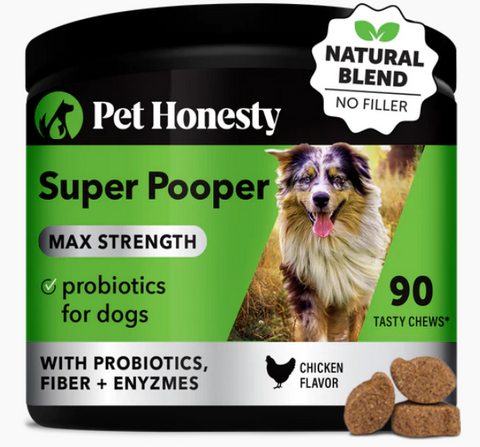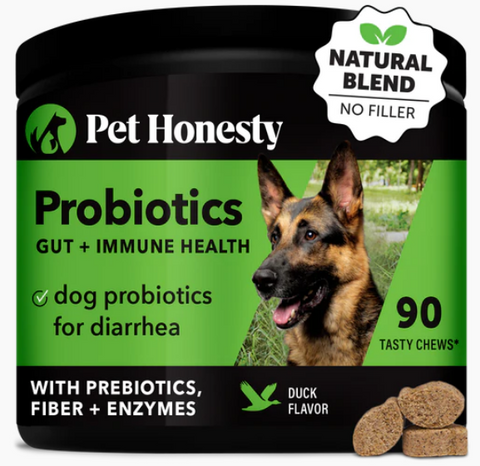When your furry friend begins to show signs of discomfort—whether it's excessive gas, vomiting, or diarrhea—it's understandable to feel a bit worried. Just like humans, dogs can suffer from an upset stomach due to various reasons. It's important to remember that dogs process food differently, and when their systems get out of whack, offering assistance can be a real act of love and responsibility.
This comprehensive guide is designed to empower pet owners, dog lovers, and anyone with a passion for animal health to understand, identify, and manage dog indigestion effectively. We'll cover everything from the root causes and symptoms to dietary adjustments, home remedies, and preventive measures to keep those tails wagging happily.
1. Understanding Dog Indigestion
The cause of your dog's upset stomach depends on numerous factors, from eating too fast to more severe underlying health issues.
What Are the Symptoms of Indigestion?
Vomiting
Vomiting can be one of the most common symptoms that point to an issue within a dog's stomach. This occurs when food isn't being broken down correctly, causing discomfort and irritation in the stomach.
Diarrhea
Just like vomiting, diarrhea can also be a sign of indigestion. If your dog's poop looks loose or watery, it could indicate that their digestive system is not functioning correctly. It's important to note if your dog is experiencing bloody diarrhea, prioritize a vet visit as soon as possible.
Flatulence
If you notice your dog passing gas more than usual, it could be a sign of indigestion. This could also mean that their diet needs to be adjusted or there may be an underlying health issue causing the excess gas.
Loss of Appetite
An upset stomach can also cause a decreased appetite in dogs. If your pup is not interested in their usual meal or snacks, it could be an indication that something is wrong with their digestive system.

What Causes Indigestion?
Eating Too Fast or Overeating
Just like some humans, dogs can get overly excited when it comes to mealtime. When your dog eats too fast, this can cause an upset stomach in dogs. Overeating can also lead to indigestion as the stomach becomes overwhelmed with food, leading to abdominal pain and discomfort.
Dietary Changes
Dogs are creatures of habit and sudden changes in their diet or introduction of new foods can cause digestive issues. It's important to transition your dog slowly when changing their diet and keep an eye out for any signs of discomfort.
Consuming Table Scraps
Giving your dog table scraps may seem like a treat, but not all human foods are safe for some and some can be harmful to their digestive system. Human foods such as onions, garlic, grapes, and chocolate are toxic to dogs and can cause indigestion.
Underlying Health Issues
In some cases, stomach problems can be a symptom of a more severe underlying health issue. If your dog's symptoms persist or worsen, it's essential to consult with a veterinarian.
Ingesting Foreign Objects
Dogs are notorious for eating things they shouldn't, including toys, socks, and other foreign objects. These can cause blockages in their digestive system, leading to indigestion.
2. Dietary Adjustments
Proper nutrition and feeding habits are key to preventing and managing indigestion in dogs - here are some pointers on how to gracefully navigate dietary adjustments!
Proper Nutrition
Ensure that your dog is getting a well-balanced diet suited for their age, breed, and health status. Avoid feeding human food, as it may be too rich or contain harmful ingredients for dogs.
Feeding Habits
Portion control is vital. Feeding your dog the right amount at regular times helps regulate digestion and prevent a stomach ache. You can also invest in slow feeder bowls to discourage rapid eating, a common cause of indigestion.
3. Home Remedies
For mild indigestion, there are several safe and effective remedies you can try at home to help your dog's digestive system rebalance itself.
Homemade Solutions
- Canned Pumpkin: Pumpkin is a super food for dogs. High in fiber, it can aid in both diarrhea and constipation.
- Probiotics: Probiotics are a game changer when it comes to restoring the balance of gut bacteria.
-
Rice and Boiled Chicken: This bland diet can soothe the digestive system

Natural Supplements
- Digestive Enzymes: Digestive enzymes can help break down food and aid in digestion.
- Ginger: Ginger has anti-inflammatory properties that can help soothe upset stomachs.
Fluid Intake
Keeping your dog hydrated can help prevent an upset stomach. Offer small amounts of water or electrolyte solution if they have diarrhea. Be sure to avoid giving too much water at once, as it can worsen vomiting.
4. Veterinary Care
Sometimes, home remedies might not be enough, and professional help is necessary.
Identifying Serious Cases
If indigestion symptoms persist for more than a day, or if your dog appears to be in significant discomfort, seek immediate veterinary care.
Treatment Options
Your veterinarian may recommend medication, such as anti-nausea drugs or antibiotics if an infection is present. In some cases, a dietary change may be necessary long-term.
5. Exercise and Activity
Believe it or not, physical activity can influence your dog's digestive health.
Promoting Regular Activity
Regular walks and playtime help keep your dog's digestive system functioning as it should. Just like humans, a sedentary lifestyle can lead to various health issues in dogs, including indigestion.
Exercise Caution
While activity is crucial, avoid strenuous exercise right after meals, as this can lead to bloat, a serious form of indigestion.
6. Preventive Measures
Taking steps to prevent indigestion can save you and your dog a lot of trouble in the long run.

Mindful Supervision
Keep an eye on what your dog has access to. Dogs are notorious scavengers and can ingest items that lead to serious indigestion.
Stick to a Routine
Consistency in feeding times and portions lowers the likelihood of indigestion. Also, avoid giving treats or snacks that are outside of their regular diet too frequently.
Choose High-Quality Foods
Invest in high-quality dog food that provides the necessary nutrition and doesn’t contain fillers or harmful additives.
FAQs
Q: How long does it take for a dog's digestive system to adjust to dietary changes?
A: It can take up to two weeks for your dog's digestive system to fully adjust to dietary changes. Slowly transitioning over about 7-10 days is recommended.
Q: Can stress cause indigestion in dogs?
A: Yes, just like humans, stress can affect your dog's digestive system and lead to indigestion. If you suspect stress may be the cause, try to identify and eliminate triggers for your dog's comfort.
Q: Can I use human medication for my dog's stomach?
A: No, it's essential to consult with a veterinarian before giving your dog any medication. Human medications can be harmful and potentially toxic to dogs.
Q: Is it safe to give my dog over-the-counter supplements for digestion?
A: It's best to consult with a veterinarian before giving your dog any supplements for digestion. While some may be safe and effective, others can have adverse effects or interact with other medications.
Q: Can food allergies contribute to my dog's upset stomach?
A: Yes, food allergies can cause inflammation in the digestive system and lead to symptoms of indigestion. If you suspect your dog has a food allergy, consult with a veterinarian to determine the best course of action.
Q: What should I do if I spot signs of indigestion after my dog eats a specific food?
A: If your dog consistently has digestive issues after consuming a particular food, it's best to eliminate it from their diet entirely. Consult with a veterinarian for recommendations on suitable replacements.
Q: Can overfeeding lead to indigestion in dogs?
A: Yes, overfeeding can put a strain on a dog's digestive system and potentially lead to indigestion. It's crucial to follow recommended portion sizes and not give excessive treats or table scraps.

Q: Are there any home remedies for preventing an upset stomach?
A: Incorporating probiotics into your dog's diet can help maintain a healthy balance of gut bacteria and potentially prevent future episodes of indigestion. Consult with a veterinarian for appropriate recommendations.
Q: How can I tell if my dog is experiencing discomfort or stomach pain due to indigestion?
A: Signs of discomfort or pain in dogs can include restlessness, pacing, excessive drooling, and changes in behavior. If you suspect your dog is in discomfort, consult with a veterinarian for proper diagnosis and treatment.
Q: Are there any alternative therapies that can help with indigestion in dogs?
A: Some pet owners have had success with acupuncture or chiropractic adjustments to alleviate symptoms of indigestion in their dogs, but every dog is, indeed, different. Consult with a certified practitioner for recommendations and precautions.
Q: Is it normal for my dog to have occasional episodes of indigestion?
A: Yes, just like humans, dogs can experience occasional episodes of indigestion. However, if symptoms persist or become more frequent, seek veterinary care.
Conclusion
Dog indigestion may seem like a small issue, but it can have a significant impact on your dog's health and well-being. By understanding the symptoms, heeding dietary adjustments, providing safe home remedies, knowing when to seek veterinary care, encouraging exercise, and implementing preventive measures, you can take a proactive role in managing your dog's digestive health.
Remember, while it’s important to be able to address indigestion at home, it's equally important to be aware of when to involve a professional. Your vet is your best ally in ensuring your dog’s digestive system remains happy and healthy. Proactive care can lead to a long, joyful, and comfortable life for your beloved pet.













